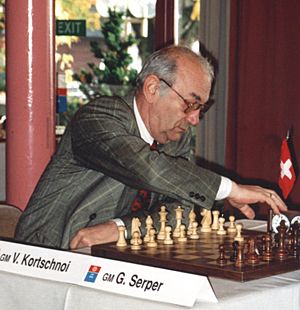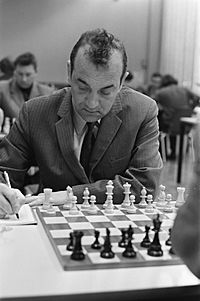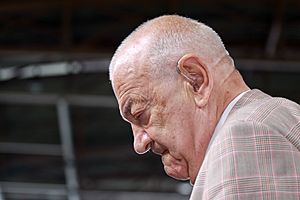Viktor Korchnoi facts for kids
Quick facts for kids Viktor Korchnoi |
|
|---|---|

Korchnoi in 1993
|
|
| Full name | Viktor Lvovich Korchnoi Ви́ктор Льво́вич Корчно́й |
| Country |
|
| Born | 23 March 1931 Leningrad, Russian SFSR, Soviet Union |
| Died | 6 June 2016 (aged 85) Wohlen, Aargau, Switzerland |
| Title | Grandmaster (1956) |
| Peak rating | 2695 (January 1979) |
Viktor Lvovich Korchnoi (born March 23, 1931 – died June 6, 2016) was a famous chess player. He was a Grandmaster (GM) from the Soviet Union and later from Switzerland. Many people think he was one of the best chess players who never became World Chess Champion.
Korchnoi was born in Leningrad, which was part of the Soviet Union. In 1976, he moved to the Netherlands and later lived in Switzerland from 1978, becoming a Swiss citizen. He played against another Grandmaster, Anatoly Karpov, four times. In 1974, Korchnoi lost to Karpov in a big tournament. Karpov became World Champion in 1975 because Bobby Fischer chose not to defend his title. Korchnoi then won two more tournaments to challenge Karpov for the World Championship in 1978 and 1981, but he lost both matches.
Korchnoi tried to become World Champion ten times between 1962 and 1991. He also won the USSR Chess Championship four times. He was part of Soviet teams that won the European championship five times and the Chess Olympiad six times. He played chess professionally until he was very old. At 75, he won the 2006 World Senior Chess Championship. He was also the oldest person ever to be in the top 100 chess players in the world.
Contents
- Early Life and Learning Chess
- International Chess Titles
- Playing for the Soviet Team
- Becoming a Strong Grandmaster
- Winning Soviet Championships
- Challenging for the World Championship
- USSR vs. Rest of the World Matches
- Secret Training Matches
- Second Time in the Candidates' Final
- Moving from the Soviet Union
- First World Championship Match Against Karpov
- Second World Championship Match Against Karpov
- Playing Against Kasparov
- More World Championship Attempts
- Later Chess Career
- Death
- Legacy in Chess
- Books by Viktor Korchnoi
- Images for kids
- See also
Early Life and Learning Chess
Viktor Korchnoi was born in Leningrad, Soviet Union, on March 23, 1931. His mother was a pianist and his father was an engineer. Both his parents moved to Leningrad from Ukraine in 1928. After his parents divorced, Viktor lived with his father and grandmother. His father died in 1941 during the siege of Leningrad. After that, his adoptive mother, Roza Abramovna Fridman, took care of him. She later lived with him in Switzerland.
He studied history at Leningrad State University.
How Viktor Korchnoi Started Playing Chess
Korchnoi learned chess from his father when he was five years old. In 1943, he joined a chess club in Leningrad. He had great teachers like Abram Model and Vladimir Zak. These teachers also helped train future World Champions like Mikhail Botvinnik and Boris Spassky.
Becoming a Young Chess Champion
In 1947, Korchnoi won the Junior Championship of the USSR. He scored 11½ out of 15 games. He shared the title again in 1948.
Earning the Master Title
In 1951, he became a Soviet Master. This happened after he finished second in the 1950 Leningrad Championship.
Playing in the Soviet Championship
One year later, Korchnoi played in the finals of the USSR Chess Championship for the first time. He finished sixth in that tournament. The next year, he did even better, finishing tied for second and third place.
International Chess Titles
Because he played so well, Korchnoi got to play in his first international tournament in Bucharest in 1954. He won that tournament. FIDE, the world chess organization, gave him the title of International Master in 1954. He also won the 1955 Leningrad City Chess Championship. In 1956, FIDE gave him the highest title in chess, Grandmaster.
Playing for the Soviet Team
Korchnoi first played for the Soviet student team in 1954. Three years later, he joined the main national team. He played for the USSR until 1974. He won 21 medals for the Soviet Union.
His team results include:
- 1954 Oslo, Student Olympiad: Team silver medal.
- 1956 Uppsala, Student Olympiad: Team gold medal.
- 1957 Vienna, European Team Championship: Team gold and board gold medals.
- 1960 Leipzig Olympiad: Team gold and board bronze medals.
- 1961 Oberhausen, European Team Championship: Team gold and board gold medals.
- 1965 Hamburg, European Team Championship: Team gold and board gold medals.
- 1966 Havana Olympiad: Team gold and board gold medals.
- 1968 Lugano Olympiad: Team gold medal.
- 1970 Kapfenberg, European Team Championship: Team gold medal.
- 1970 Siegen Olympiad: Team gold and board bronze medals.
- 1972 Skopje Olympiad: Team gold and board gold medals.
- 1973 Bath, European Team Championship: Team gold medal.
- 1974 Nice Olympiad: Team gold and board bronze medals.
Becoming a Strong Grandmaster
Korchnoi became a very strong player in the Soviet chess system. He played against other future Grandmasters like Mikhail Tal, Tigran Petrosian, and Boris Spassky. At first, Korchnoi had an aggressive style, especially when he was counterattacking. He was also very good at defending difficult positions.
In the 1950s, his results were sometimes up and down. But in the 1960s, he became more consistent. He won tournaments in Kraków (1959), Buenos Aires (1960), and Córdoba, Argentina (1960). After winning in Budapest in 1961, Korchnoi was seen as one of the best players in the world.
Winning Soviet Championships
Korchnoi won the USSR Chess Championship four times:
Challenging for the World Championship
Korchnoi first qualified to challenge for the World Championship in 1962. He played in the 1962 Candidates tournament in Curaçao. He finished fifth in that tournament. During this event, he beat Bobby Fischer twice.
He won tournaments in Havana (1963), Gyula, Hungary (1965), Bucharest (1966), and Sochi (1966).
First Time in the Candidates' Final
In the 1969 World Championship cycle, Korchnoi played very well. He qualified for the Candidates' matches. He beat American Grandmaster Samuel Reshevsky in 1968. Then he beat Mikhail Tal in Moscow. This led him to the Candidates' final against Boris Spassky. Spassky won that match in Kiev in 1968.
USSR vs. Rest of the World Matches
Korchnoi played for the USSR team in the first Russia (USSR) vs. Rest of the World match in Belgrade in 1970. He played against Hungarian Grandmaster Lajos Portisch.
In 1984, after he had moved from the Soviet Union, Korchnoi played for the "Rest of the World" team against the USSR. He played against his former teammate, Lev Polugaevsky, and also against Vladimir Tukmakov. Korchnoi was the only player to play for both sides in these special team matches.
Secret Training Matches
To prepare for his matches, Korchnoi played some secret training games. In 1970, he played against his friend David Bronstein. In 1971, he played a secret training match against Anatoly Karpov, who was a close friend at the time. This match ended in a draw. These games were kept secret for many years.
Korchnoi won his first match in 1971 against Efim Geller. But he lost in the next round to Tigran Petrosian.
Acting in a Film
In 1972, Korchnoi appeared in a Soviet film about chess called Grossmeister. He played the role of the main actor's chess trainer.
Second Time in the Candidates' Final
In the 1975 World Championship cycle, Korchnoi and Karpov tied for first place in a tournament in Leningrad in 1973. In the 1974 Candidates' matches, Korchnoi first beat Henrique Costa Mecking from Brazil. Then he played against Petrosian again. Korchnoi won this match.
After beating Petrosian, Korchnoi faced Karpov in the Candidates' Final. The winner would challenge the World Champion, Bobby Fischer. Before the match, Korchnoi faced some difficulties. He struggled to find other Grandmasters to help him prepare. Karpov eventually won this match in Moscow by a close score. Because Fischer refused to defend his title, Karpov became the new World Champion in April 1975.
Moving from the Soviet Union
After the 1974 Candidates' Final, Korchnoi felt he needed to leave the Soviet Union. The Soviet authorities tried to stop him from playing in international tournaments outside the USSR. Even when he was invited to a tournament in Estonia, he was not allowed to go.
Eventually, the ban was lifted, and he played in some tournaments. In 1976, Korchnoi played in the Amsterdam tournament and won it. After the tournament, he decided to ask for political asylum. He became the first strong Soviet Grandmaster to move away from the Soviet Union. He later settled in Switzerland and became a Swiss citizen.
First World Championship Match Against Karpov
For the next World Championship cycle (1976–78), Korchnoi was allowed to play even after moving from the Soviet Union. He first beat Petrosian again. Then he won against Lev Polugaevsky. In the final match, he faced Spassky and won, becoming the challenger for Karpov's title.
The World Championship match of 1978 was held in Baguio, Philippines. There was a lot of unusual activity outside the chess board. There were arguments about chairs, flags, and even a yogurt sent to Karpov.
The match itself was exciting. The first player to win six games would be the champion. After 17 games, Karpov was leading 4–1. Korchnoi fought back bravely. He won three games and drew one, making the score 5–5 after 31 games. But Karpov won the very next game, winning the match 6–5.
Second World Championship Match Against Karpov
As the player who lost the last World Championship match, Korchnoi automatically qualified for the next cycle. He again defeated Petrosian in 1980. Then he beat Polugaevsky a second time. In the final match, he was leading against Robert Hübner when Hübner stopped playing. This meant Korchnoi would challenge Karpov for the title again.
This final match was held in Meran, Italy. Karpov won this match by six wins to two, with ten draws.
During this time, Korchnoi's wife and son faced difficulties in the Soviet Union. They were eventually allowed to leave the USSR in 1982.
Playing Against Kasparov
Korchnoi continued to play an important role in chess. In 1983, he beat Lajos Portisch. In the next round, he was supposed to play against the young Soviet Grandmaster Garry Kasparov. The Soviet Chess Federation tried to stop Kasparov from playing in the planned location.
However, Korchnoi agreed to play Kasparov in London. This was a kind gesture because Korchnoi had technically already won by default. Kasparov, who was 32 years younger, proved to be too strong. He beat Korchnoi by a score of 7–4.
More World Championship Attempts
After the 1983 Kasparov match, Korchnoi kept playing at a high level. He played in the Candidates' Tournament in 1985. In 1988, he made it to the final 16 players but lost in the first round.
Finally, in 1991, he won his first-round match against Gyula Sax from Hungary. But he then lost to Jan Timman from the Netherlands. This ended his long journey of trying to win the World Championship, which lasted from 1962 to 1991.
Later Chess Career
Korchnoi continued to play chess in Europe and around the world even when he was very old. He lived in Switzerland and often played for their Olympiad team.
From 2001 onwards, Korchnoi wrote many books about his chess career. He published books of his games, an updated story of his life, and a book about rook endings.
In 2001, Korchnoi won the Biel Chess Festival for the second time. He had won it before in 1979. This 22-year gap is one of the longest times between winning the same international chess tournament.
In September 2006, Korchnoi won the 16th World Senior Chess Championship at age 75. He scored 9 wins and 2 draws.
In January 2007, Korchnoi was ranked 85th in the world by FIDE at age 75. He was the oldest player ever to be in the top 100. In 2011, he won a notable game against 18-year-old Fabiano Caruana, who was a very strong player.
Korchnoi became the oldest player to win a national championship when he won the 2009 Swiss championship at age 78. He won it again in July 2011, shortly after his 80th birthday.
Declining Health
In late 2012, it was reported that Korchnoi was recovering from a stroke. He was not expected to play competitive chess again. He had to withdraw from a tournament in 2013 due to his health.
However, in 2014, he returned to play a two-game match against Grandmaster Wolfgang Uhlmann. Korchnoi won both games. The combined age of the two players was 162 years, which is likely a record for a match between Grandmasters. In 2015, they played a rapid chess match that ended in a 2–2 draw. Korchnoi's last match against another Grandmaster was in November 2015, against Mark Taimanov. The combined ages of the players was 174. Korchnoi won that match 2–1 with one draw.
Death
Viktor Korchnoi died on June 6, 2016, in Wohlen, Switzerland. He was 85 years old.
Legacy in Chess
FIDE President Kirsan Ilyumzhinov said that Korchnoi "helped make our sport popular." He is seen as one of the strongest and most interesting players in chess history. Many people, like chess writer Leonard Barden, called him "the greatest player never to have been world champion."
Korchnoi was good at many styles of play. He could attack, counterattack, and was a master of the endgame. He was known for his counterattacks. He had a very good record against Mikhail Tal, who was a famous attacker. Korchnoi also had winning records against World Champions Petrosian and Spassky. His record against Botvinnik and Fischer was equal. He defeated nine different undisputed world champions, from Botvinnik all the way to Garry Kasparov and Magnus Carlsen.
Sometimes, Korchnoi would show his frustration after losing games by sweeping the pieces off the board. He had a reputation for being short-tempered. But sometimes, he was very kind. In a tournament in 1983, his opponent, Larry Christiansen, was late because his car ran out of gas. Instead of starting Christiansen's clock, Korchnoi waited for him to arrive.
Even though Korchnoi never became World Champion, many consider him the strongest player who never achieved that title. This honor is also often given to players like Akiba Rubinstein and Paul Keres.
Some chess openings and variations are named after Korchnoi. For example, there is the Korchnoi Variation in the English Opening, the Korchnoi Gambit, and the Korchnoi Defense in the Sicilian Defense.
Chess Records
Korchnoi defeated nine undisputed world champions (Botvinnik, Smyslov, Tal, Petrosian, Spassky, Fischer, Karpov, Kasparov, and Carlsen). This is a record he shares with Paul Keres and Alexander Beliavsky.
He is also the only player to have won or drawn at least one game against every World Chess Champion since World War II.
Books by Viktor Korchnoi
- King's Gambit (1974)
- Chess is My Life (1977)
- Persona non grata (1981)
- My Best Games, Vol 1: Games with White (2001)
- My Best Games, Vol 2: Games with Black (2002)
- Practical Rook Endings (2002)
- Chess is My Life, Vol 3: Biography (2005)
Images for kids
See also
 In Spanish: Víktor Korchnói para niños
In Spanish: Víktor Korchnói para niños
- List of Jewish chess players
 | James Van Der Zee |
 | Alma Thomas |
 | Ellis Wilson |
 | Margaret Taylor-Burroughs |




